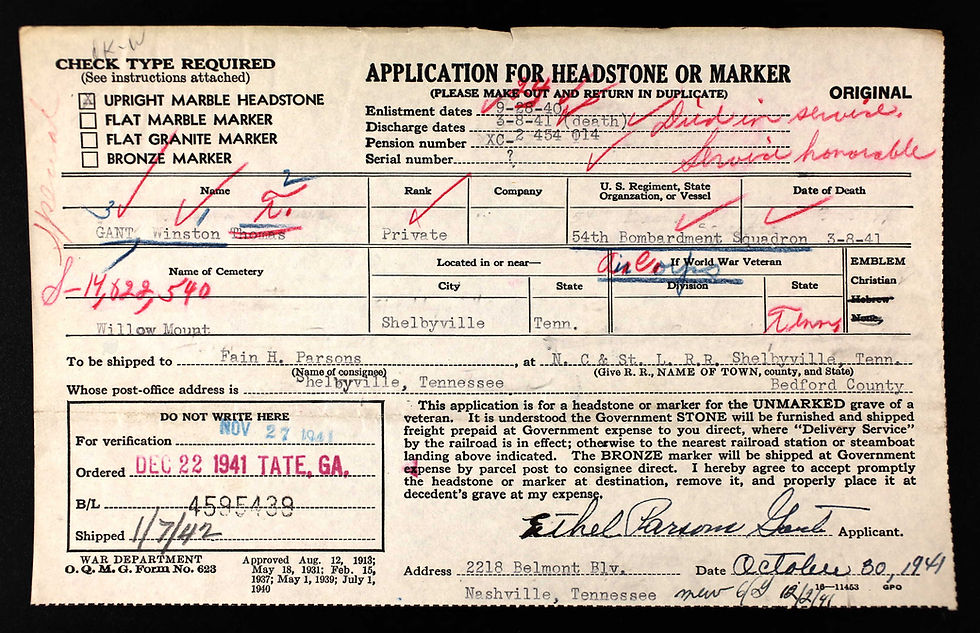Winston Gant-The Ultimate Sacrifice
- Vicki Ekmark
- May 10, 2020
- 4 min read
Updated: May 1, 2022
Explore the rest of this website about my dad's B-17 crew: www.rumboogiecrew.com
Click ALL POSTS at the top of this page to return to blog table of contents.
Click below to listen to the audio blog.

An Army bomber crashed in the swampland near New Orleans killing Private Winston Gant. Two officers in the plane, who bailed out safely, said his
parachute shrouds tangled in the falling ship. The arrow in the picture points to Pvt. Gant's body in front of the partially opened parachute.
Private Winston Gant was a six-foot two bombardier and the middle child of three boys in the Gant family. In early 1941, he wrote home about a probable upcoming promotion: “I think my rating will be out before the first of next week. It’s the best news I have had in a long time. I’m hoping so much I can get home by the first of May.” Only 20 years old at the time, Winston died when the bomber he was riding in ran out of fuel and crashed into a marsh forty miles south of New Orleans. What follows is a composite account from several newspapers of what happened that day.
- - - - - - - - - - - - - - -
Dateline: March 8, 1941. Lieutenants Donald Lang and John Moore were forced to bail out of their army bomber when it stalled in mid-air and then crashed. A third crew member, Pvt.

Winston T. Gant, also bailed out but did not survive. Still suffering from exposure and shock, the two officers returned to Orlando late yesterday afternoon. They said that at the time of their flight, they had been on their way to drop Winston off to visit his brother [RBC Gunner George Gant].
- - - - - - - - - - - - - - -
Lang and Moore were lost in the wet and windy marshlands for approximately five hours, and dusk was nearing when rescue parties finally reached them. They were picked up by Ken Oliver of Houma, LA who took them aboard an amphibian plane. Relating their terrifying experience, the officers revealed that if they had been forced to stay in the swamp another thirty minutes it would have meant “curtains for us.”
Just before bailing out of the big bomber, Lt. Lang had messaged New Orleans: “running out of gas and we’re hopping out.” The officers both said that they were approximately 750 feet up when Lang motioned to his companions to jump. “I told them to bail out,” Lang said. “Lt. Moore went first and made it okay. Next, at 700 feet, Pvt. Gant went, but unbeknownst to me, he didn’t make it. His chute became tangled in the tail structure [the vertical and horizontal stabilizers].”
“After I thought my crew had cleared the ship, I then bailed out,” Lang continued. “I consider myself extremely lucky in view of the fact that when I jumped, I was only about 200 to 250 feet above the ground, and my chute opened as I hit the ground. I landed less than thirty feet from the wrecked bomber.” He continued, “I got buried up to my armpits in the muck which was about waist deep. I saw the body of Gant laying behind the wreckage of the bomber beside his parachute. He was buried in the mud about four feet. I spent an hour digging him out and placed him on the parachute. Gant’s neck was broken, and I knew I could do nothing for him. I noticed that a pair of sun glasses he had in his leather jacket had somehow remained intact. I then headed toward an oil well flare in the hope of obtaining help. I also attempted to reach Lt. Moore, who had landed approximately a mile from the scene, but we were separated by water. My most horrible experience was trying to maneuver through the mess, hoping against hope that I would escape the treacherous holes in the marshlands.”
Lt. Moore told how he crawled on the marshland “for hours” before finding higher ground. “At the spot where my parachute took me, the water was up to my shoulders. I saw a Fairchild plane above me. They dropped a note, which I found, telling me that they would drop a jacket and some cigarettes. They did so, but I never found them,”
- - - - - - - - - - - - - - -
It was later announced that the body of Pvt. Gant will be sent to Shelbyville for burial. Winston Gant’s mother was confined to her bed last night, prostrate with grief over the news of her son’s death. The tragedy was particularly poignant for she had received a letter from him just a few hours before he was killed. “I am going to New Orleans,” he wrote, “in a big bomber that we use for bombing missions, and it should not take long since it is only a distance of about 600 miles. We should get there in about seven hours.”


Click ALL POSTS at the top of this page to return to blog table of contents.



Comments